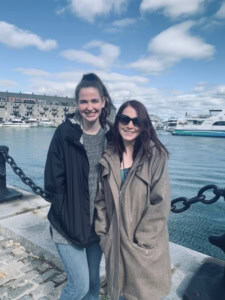A Sister’s Perspective of NMOSD by Amanda Fortune
My name is Amanda Fortune, and my sister has Neuromyelitis Optica Spectrum Disorder (NMOSD). I wanted to share my perspective as the sibling of someone with a rare neuroimmune disorder and how I became involved with the SRNA community through this connection.
Growing up, I knew that I loved science and hoped to pursue a career in the medical field. At the beginning of my senior year of high school, I was already committed to university and planning on pursuing biology on the pre-medical track. Little did I know how much I would see of hospital rooms and doctors in the coming months. When I first received the text that my sister was at the hospital, I did not know how much it would impact my family.
Initially, she was hospitalized for seven weeks and diagnosed with Acute Disseminated Encephalomyelitis (ADEM). She had several relapses, including bilateral optic neuritis. Throughout this time, my parents were constantly at the hospital while I visited as much as I could. Although I wanted to be by her side, I still had to attend school and care for things at home. As her sister, it was hard not to feel guilty. I would often wonder why I was healthy while my sister was in a hospital bed, paralyzed, and struggling with cognition and speaking, especially as I continued attending school events and going to my volleyball games. I also felt that none of my peers understood the severity of her condition, as these rare neuroimmune disorders are so unknown to the general public. In time, she relearned how to walk and talk and has been attack-free for three years on a preventative medication. She still struggles with the effects of this disease today, but as her sister, I help out as much as I can.
After experiencing the devastating results of a rare neuroimmune disorder in my own family, I learned more about healthcare and was driven to pursue medicine and research. As someone with a passion for biomedical research, I also looked for ways to involve myself in the community. The summer before my senior year of college, I received the opportunity to do an internship at Dr. Michael Levy’s lab at Massachusetts General Hospital, where I worked on a project studying genetic mutations associated with MOG antibody disease (MOGAD). I discovered a passion for research and continued to explore MOGAD and NMOSD. For my senior capstone, I wrote and presented a report on MOGAD and my experience in Dr. Levy’s neuroimmunology lab and was able to educate my fellow students and faculty at Simmons University.
I continue to be involved in the community and hope to spread awareness of rare neuroimmune disorders through the perspective of being a sibling. I hope to use my connection to these debilitating disorders as a drive to pursue my future career as a researcher. As I have worked in fields surrounded by medical doctors and other healthcare staff, I find that very few people are aware of these rare neuroimmune disorders, and I hope to continue raising awareness of them.
Articles represent the views of the author and do not necessarily represent the views of SRNA.



